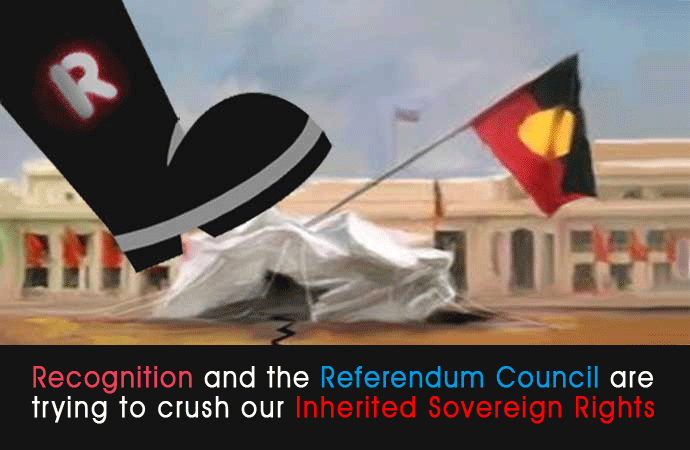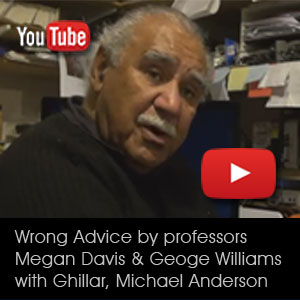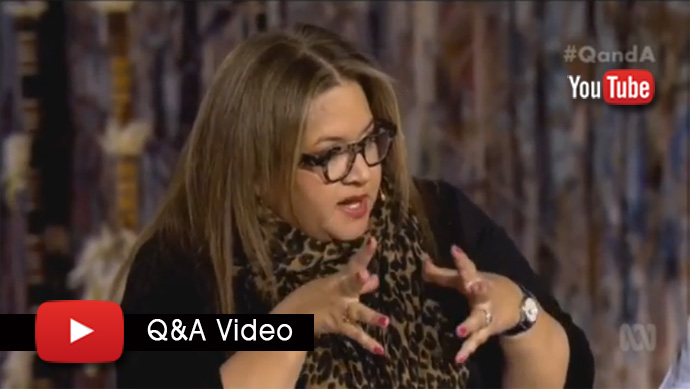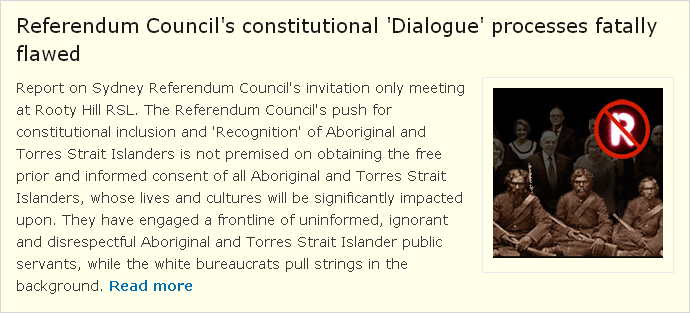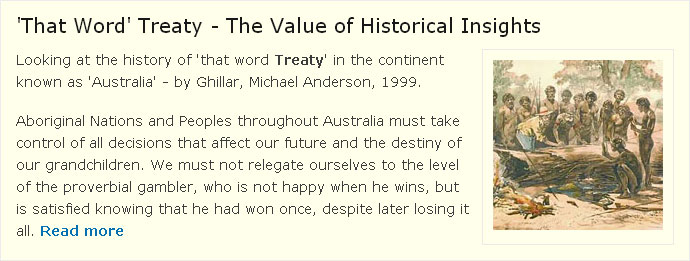Perfecting Trickery: The Referendum Council
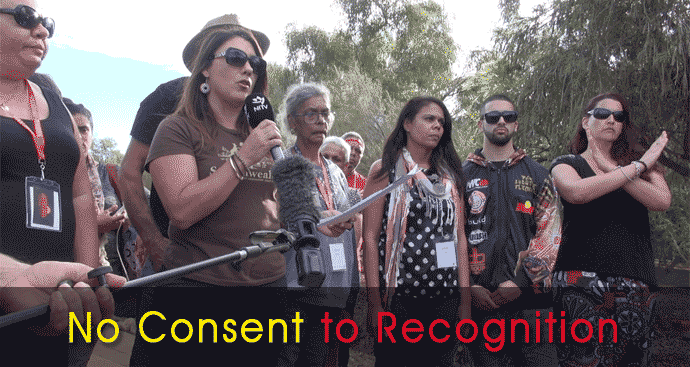
Front left to right: Delegates - Serena Williams, (Ngunnawal), Lidia Thorpe (Gunnai and Gunditjmara), Jenny Munro (Wiradjuri), Linda June Coe (Wiradjuri), George Coe (Wiradjuri) and Observer Ruth Gilbert (Wiradjuri). This image taken after they and others walked out of the National Referendum Council meeting at Uluru in disgust at the procedures and gagging.

On his return from Uluru, Ghillar, Michael Anderson, Convenor of the Sovereign Union, last surviving member of the founding four of the Aboriginal Embassy and Head of State of the Euahlayi Peoples Republic, details the rigged processes of the Referendum Council's National Convention and the subsequent media:
"I was absolutely shocked and horrified at the disjointed discussion that occurred on ABC TV Q&A last night ( 29 May 2017) from Parliament House, Canberra.
In my opinion the conclusions that occurred at the Referendum Council's National convention at Uluru were totally betrayed by the Q&A panel.
Having been permitted to sit as an observer in the main National Convention of the Referendum Council at Yulara near Uluru, I was privy to observe the proceedings and I sat through the 'Synthesis' of the Regional Dialogues and what they called the breakout workshops as well, where the key topics were 'The Voice', 'Treaty', 'Strategy'.
In respect of the Synthesis (summary) of the Dialogues it was very clear that nationally the specially selected people by the Land Councils (invitation-only delegates) independently concluded that it must be made clear that First Nations sovereignty was never ceded.

Robert 'Robbie' Thorpe from the Krautungalung people of the Gunnai Nation was a Melbourne delegate. Robbie, along with many others, was silenced by the convenors of the Referendum Council Meeting at Uluru.
(Image source: NITV/SBS)
The next key point was the fact the people, from around this island continent, who attended these Regional Dialogues, were emphatic that they did not want a minimalist approach to constitutional reform and they did not want it to be symbolic. They wanted something substantive that would effect real and positive change. It was very clear that they did not just want to remove Section 51(26) the Race Power, because they did not want anything in the constitution that could be used in a manner that would be detrimental to First Nations Peoples exercising their rights and their right to be self-determining.
More importantly, the presentation in the Synthesis/Summary does suggest that an overwhelming majority of people, who attended these Regional Dialogues, were determined that, because sovereignty was never ceded, that Treaties should be made with Sovereign First Nations throughout the continent and they determined that our ancient tapestry of languages and cultures cannot be destroyed and lost forever to our future generations.
Noel Pearson, in his introductory presentation, made use of Mr Bayona-Ba-Meya, Senior President of the Supreme Court of Zaire's spiritual notion of sovereignty, which was articulated in the International Court of Justice in the 1975 Western Sahara case :
: the ancestral tie between the land, or 'mother nature', and the man who was born therefrom, remains attached thereto, and must one day return thither to be united with is ancestors. This link is the basis of the ownership of the soil, or better, of sovereignty :
This tapestry of colour of the diverse Sovereign First Nations became visual when the coloured Tindale map was put up for all to see. It is from this that we must understand the richness of our ancient Law and culture, which must be defended and maintained at all costs. We must always tell ourselves on a daily basis that we have the oldest civilisation on planet Earth, and we are the Peoples who perfected the art of peaceful co-existence and sustainability, through the teachings handed down from the time of Creation, and that we are intrinsically linked to all things natural through the definition entitled 'humanity'.
The political confrontation that occurred at the National Convention was caused by the very apparent stacking of the meeting by the organisers (Australian Institute of Aboriginal and Torres Strait Islanders Studies, AIATSIS), no doubt supported by the Referendum Council. What was visually clear during the whole process was the apparent divide between members of the Referendum Council. For some of the elected delegates it was clear that when they were talking about issues that were not supportive of the Referendum Council's ambitions, Noel Pearson and/or Pat Anderson were constantly leaving the meeting to have counsel with Mark Leibler, the Zionist Co-chair of the Referendum Council. It became clear that he is the puppet-master, who was clearly steering this ship as he sat outside of the meeting in a private conference area inside the Sails Hotel of the Yulara Ayers Rock Resort.
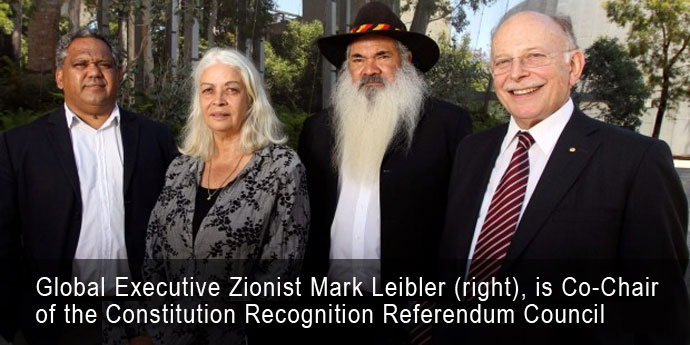
Image: l-r Noel Pearson, Marcia Langton, Patrick Dodson with Mark Leibler at a 'Recognise' meeting in 2015. The 'Referendum Council' is the updated version of the government propaganda machine, because the 'Recognise' campaign brainwashed many non-Aboriginal people but failed to convince First Nations people that is would not affect their inherited sovereign status. Although Langton and Dodson from the government elected 'Recognise' panel, are not officially involved with the 'Referendum Council', they are still working on the same agenda behind the scenes.
One does not have to take a second guess that he was privileged to live-streaming with other lawyers by his side. His controlling advice was apparent. A constitutional referendum was the only objective - that you must maintain the appearance of consent to the theme of constitutional reform, knowing that the people did not want just 'Recognition' and/or a minimalist approach, neither did they want to be assimilated into the colonial constitution of the occupying power.
Last night's Q&A program was embarrassing to watch, because it was very evident that the panel was not in unity 'with a clear and defined outcome' from Uluru. In response to questions being asked by the moderator, the panel kept stumbling and were not clear and precise. Noel Pearson's emphasis on a 'Voice' was misleading and ambiguous and our cause for concern is such that the panellists, who attended the convention, had in fact lost their way and that is the price for betrayal. They failed to clearly articulate what was decided at Uluru.
As a person who has been engaged for more that 40 years in political confrontation and advocacy, I would say Noel Pearson marked his territory by steering the conversation to constitutional reform, when that was not a decision made at the National Convention at Uluru.
Furthermore, Megan Davis's performance was as honourable as she could make it, knowing that what was being discussed on Q&A was not a true representation of the outcome. She reminded Pearson that the Final Report has not been released. Pat Anderson's performance represented uncertainty and confusion. Stan Grant realised this frustration and attempted to wade a path forward without saying what he really wanted to say. The young playwright and writer Nakkiah Lui was clearly lacking a legal and political understanding of the consequences and spoke passionately with a very convincing colonised mind, which demonstrated what a Stockholm Syndrome mindset looks like.
The concluding presentation by the young interpreter made the Uluru Statement sound very nice and sweet. It sounded like a poem not a legal statement. In fact it cannot be argued that it is a legal statement. It is a statement of ambition romanticising a dream.
In reality what did not take place at the Referendum Council Convention at Yulara/Uluru was proper discussion on the two primary questions:
- Which way are we to go? and
- What are our choices, our pathways?
What was not raised nor discussed was that on these points it is imperative that they are followed up by definitions, that is to say:
- Do we want to be included in the constitution by way of constitutional referendum? or
- Do we want a Treaty/ Treaties between the Commonwealth government, or Britain, and the Sovereign First Nations of this island continent as we continue to hold the continental common law?
These are the questions that should have been dealt with in detail, but were never responded to individually.
The program and agenda items represented the hedging of these two very important questions. Clearly, members of the Referendum Council worked very hard to avoid making this a black and white issue on these two points. In fact, they drove the proceedings of the meeting in such a way that confused everybody.
Let me set aside the agenda items for the moment.
The National Convention was confused from the outset. The Victorian delegation was alarmed that prior to their arrival at Uluru, the 10 Regional Dialogue elected delegates were being accompanied by other 'delegates' chosen by some means without their knowledge. In fact it was suggested that they were in excess of 10 or more people invited as 'delegates', without any participation in the Victorian Regional Dialogues themselves.
During the Regional Dialogues the elected delegates were absolutely furious when they learned that the paid facilitators at all of the Regional Dialogue meetings were granted 'delegate' status by the Referendum Council for the National Convention. This became apparent after the Regional Dialogues had been concluded, and not during the proceedings of the Regional Dialogues themselves. Consequently, these same paid facilitators and staffers controlled all discussions during the breakout workshops at the National Convention.
Another significant point that created angst, because of confusion, was the fact that the New South Wales delegates, elected at the Dubbo and Sydney Dialogues, were completely misled as to how the proceedings were to be conducted, that is, of the five points raised during the Regional Dialogues, they were of the understanding that they each had been given a mandate from their Regional Dialogue to go and speak to that mandate on those five points, for and on behalf of their people.
This was not the case and the delegates felt dejected, insulted and tricked, because there was only one agenda, constitutional inclusion. Instead new agenda items were set in place, which appeared to avoid the conclusions of the Regional Dialogues.
In a breakout workshop Lyall Munro walked out in disgust because the facilitator, Josie Crawshaw, ignored him and did not give him speaking rights and Lyall in frustration walked out of the workshop and Josie Crawshaw said words to the effect 'good riddance'. To the credit of the majority in the workshop the facilitator was chastised by the group and then John Christopherson took the microphone from her. Pat Anderson and Megan Davis later apologised to Lyall Munro for the facilitator's rude and unprofessional behaviour.
Later in a plenary session the elected delegates were totally frustrated at not being afforded the right to discuss in whole matters they were mandated with and the stifling of those voices by the organisers resulted in the walkout of more than 30 delegates and observers. This walkout could have been avoided had here been provisions for open discussion in the plenary sessions on the issues discussed at he Regional Dialogues. The delegates could not follow what was happening, because the facilitators did not know nor understand the finer points of detail in respect to the topics that were being canvassed and how those topics fitted within the mandate of those formally elected to be delegates.
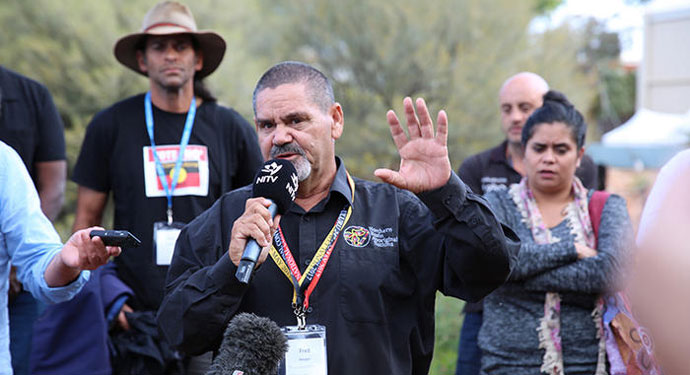 Fred Hooper from the Murrawarri Republic speaks out at his disgust is the processes conducted by the Referendum Council convenors at the Uluru Referendum Council National Meeting in May 2017
Fred Hooper from the Murrawarri Republic speaks out at his disgust is the processes conducted by the Referendum Council convenors at the Uluru Referendum Council National Meeting in May 2017(Image source: NITV/SBS)
The lost time in the workshops was due primarily to two factors:
- the facilitators not knowing or understanding the true definitive nature of the topics, and
- staffers and other facilitators of Regional Dialogues appeared to have greater rights to speak and take up time, as opposed to permitting the elected delegates from the Regional Meetings to speak on the topics. In fact there is a third point which is, some observers sought to be heard as well, which should have been their right from the outset because what was being discussed at this Convention affects every Aboriginal person, no matter what their status or station in life. More importantly, it is the whole future of our race and of our Sovereign First Nation Peoples of this Country that is at stake.
Despite all the rigging and wrongdoings, the consensus that was finalised was:
- Sovereignty was never ceded;
- Rejection of being 'recognised' in the constitution;
- No support for a minimalist approach to constitutional reform;
- Agreement that a Treaty/Makarrata Commission be established to develop a national framework going forward that would permit each Sovereign Nation State to negotiate their own respective Treaty;
- Removal of section 51 (26) from the constitution;
- Establishment of Truth and Justice Commission;
- Resolved also that the constitution of Australia should have a Bill of Rights; and
- Establishment of an elected Voice to the parliament and to ensure that this Voice has constitutional backing.
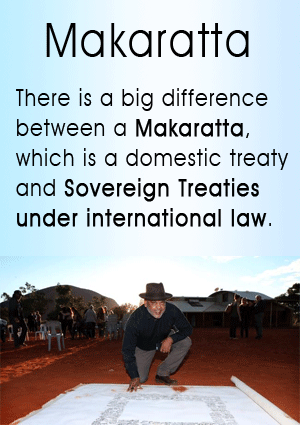
Important:
The overall move is to coerce First Nations Peoples into the Constitution so that the opportunity for Sovereign Treaties is no longer possible, because citizens cannot Treaty amongst themselves under the true international law meaning of Treaty.
Picture: Noel Pearson, a member of the government's Referendum Council, with the Uluru Statement.
Going forward, I must say there was not enough time to discuss definitive aspects of each of these points. In particular, on the question of a Treaty/Treaties or Makarrata there was no time for a dialogue on this point, or to flesh out the differences between a Makarrata, which is a domestic treaty, and Sovereign Treaties under international law. Neither was it properly discussed that the Australian constitution already has the facility to treaty with Sovereign First Nations, without a referendum.
Noel Pearson could only present one pathway - be in the constitution first, then talk about Treaty/Treaties, but that is wrong legal advice, because as soon as First Nations Peoples become constitutionally recognised by a Constitutional head of power, it can be argued that the Convention at Uluru consented to be governed as Australian citizens. If this were successful and the outcome of anything going forward, then there can no longer be sovereign treaties, only domestic treaties, controlled by the existing colonial laws of Commonwealth and State governments.
Having been the Director of Research with the National Aboriginal Conference (NAC) from 1981 to 1985, I worked with a special Sub-Committee of the National Aboriginal Conference, which was established to develop a Treaty package for negotiations with the Commonwealth government. The two primary preconditions that were put to the late Malcolm Fraser government were that the National Aboriginal Conference would not agree to enter into any negotiations of any kind, unless the government agreed to these primary conditions:
- Aboriginal Peoples according to their Law and custom maintained proprietary interests in all lands. This statement was inclusive of the whole of the island continent and its adjacent islands, and
- Aboriginal Sovereignty was never ceded.
It was always made clear that the NAC was indeed negotiating from a position of strength by being more than equal in status, under our Law and culture, to that of the Commonwealth government. The NAC was very adamant that they were not negotiating from a deficit position, that is, they were elected by their people to advise the Commonwealth government on policy matters, but were very clear and forthright when it came to the negotiations for the Treaty. They made it clear that they were not advisors, they were equal parties.
The NAC was not advisory in this regard, but were elected men and women who stood more than equal to the parliamentarians negotiating this Treaty. The negotiations were between the elected sovereign Peoples represented by the NAC, and the Commonwealth government, which was elected by mainstream society. We were, and are, the sovereigns of the soil, they are colonial invaders. There was no doubt of this position.
At this time, the only contested debate that was focused on was the question: If we are to negotiate a Treaty then it must be understood that there was an absolute requirement to define the legal status of this Treaty.
- Was it to be a domestic Treaty controlled by the Australian Constitution and State constitutions, and thus fall under the jurisdiction of that State? or
- Was it to be a Treaty governed by international law under the Vienna Convention on the Law of Treaties?
In this regard, the Commonwealth Solicitor-General advised the late Malcolm Fraser's government that it would be wise to avoid the word 'Treaty' because of its international legal connotations, and suggested that the government avoid this terminology going forward.
The NAC tried to appease the government by locating the Yolgnu word 'Makarrata'. Makarrata was more appealing to the Commonwealth government at the time, because it was a local Yolngu word, which they thought meant settlement and conclusion of conflict and resumption of normal relations.
The only problem with this was the fact that it became a domestic treaty, controlled by the Commonwealth constitution, State and Territory laws, and States and Territories would also be party to any Treaties. This meant that First Nations' continuing sovereignty was acquiesced to the colonial authorities.
By 1983, the NAC had concluded that the Commonwealth of Australia was merely a colonial state with the status of self-government and that they ruled in right of the Crown of Britain only. Having drawn this conclusion, the NAC then agreed to send a formal political diplomatic delegation to four key African Nations. The media briefly reported this diplomatic mission, which included former Prime Minister Gough Whitlam, as Australia's leading non-Aboriginal statesman, Ossie Cruse, as the elected NAC diplomat, and myself as his Advisor and Director of treaty research. This delegation ensured a high-level status for this mission, which made it possible for us to meet with joint parliamentary committees on foreign affairs in Nigeria and the Nigerian Vice-President, in the absence of the President. The high level diplomatic mission also met with President Nyerere of Tanzania and the President of Zimbabwe, Robert Mugabe. Later we met with the foreign minister of Kenya and had formal meetings, whilst in transit, with government officials of India and with leading government officials of Saudi Arabia who hosted us at the Riyadh international airport.
It is also important to acknowledge that this high level diplomatic mission concluded with us meeting with the full plenary session of World Council of Churches in Geneva, where we addressed them about our issues and later with the lawyers and the head of the International Labor organisation (ILO).
The media portrayed this diplomatic mission as a campaign to have the African nations boycott the looming Commonwealth Games in Brisbane. This was fake news and so far from the truth. Our endeavours were to inform these former British colonies of the NAC Treaty negotiations and to gain their support in ensuring an international oversight of our negotiations by having the Commonwealth Heads of Government (CHOGM) establish special observers of the Treaty process.
Today we are in a much lesser position than the NAC was in 1983. Negotiations are not being established from a position of strength, but rather from a deficit position, which is depicted by the Uluru Statement when they say we are powerless.
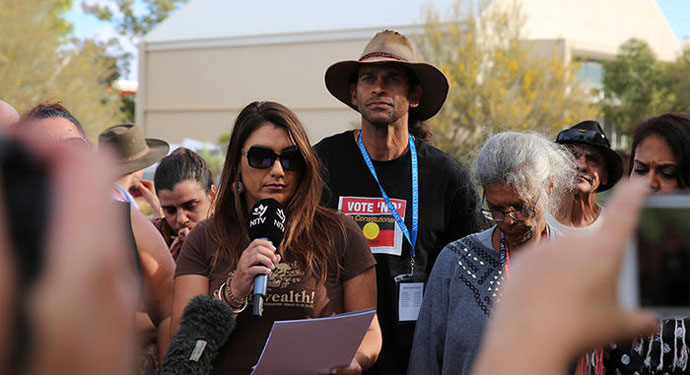
Delegates who walked out of the Referendum Council National meeting in Uluru in disgust at the dialogue processes and for being gagged by the convenors. Front central from left: Lidia Thorpe (Gunnai and Gunditjmara), David Peachey (Wiradjuri) and Jenny Munro (Wiradjuri)
(Image source: NITV/SBS)
The overall conclusion of the NAC, at that time, was the realisation that it was Britain we should have been negotiating with and not the colonial authorities of Australia. Former PM Bob Hawke, his Foreign Minister, Gareth Evans and Attorney-General, Michael Lavarch, realised their deficit position in any Treaty negotiations.
Surprisingly enough, I conclude that the Treasurer in the late Malcolm Fraser government, John Howard MP, realised his government's deficit. This realisation rang true when he observed our high-level diplomatic mission to African leaders.
Let there be no doubt former PM Bob Hawke, Michael Lavarch and Gareth Evans understood Australia's weakness. It was this realisation that caused them to travel to England in 1986 to negotiate with the British government that Britain relinquishes any power and authority of the British parliament to make laws for the Australian colonial state. This concluded in the Australia Act of 1986.
The 1986 Australia Actcame as a surprise to many in the public arena and no-one was informed of the reasoning for the establishment of the Australia Act .
If we are to go forward we need to study this move by the Hawke Labor government, because their move, in their opinion, prevents us from negotiating an international Treaty with Britain.
Thus, this is something that must be on our agenda going forward.
Later the elected Hawke Labour government was quick to shut down the National Aboriginal Conference. Their only method of shutting down the NAC was to withdraw all its funds, which they did very successfully. Hawke then took up ideas to restart a Treaty process under a Labor regime and he made this statement at Barunga in the NT. He completely ignored all the work that had been done between the NAC and the late Malcolm Fraser's government, which had made enormous progress towards a Treaty of settlement and co-existence in this country.
The late H.C. Nugget Coombs established the Federation of Aboriginal Land Councils that was to work with the Hawke Labor government to bring an end to the National Aboriginal Conference. These Regional Land Councils were to assume control of policy development within their regions. I can say that Nugget Coombs did not want the 'educated eastern states Aboriginal people' to politically educate the 'tribal fullbloods', who were continuing to practice their Law and ceremony. The Land Councils were a great vehicle to achieve this end in the separation of 'eastern state Aboriginal people' and 'tribal fullbloods'.
Unfortunately, at this Referendum Council National Convention, this ugly division between the 'tribal fullbloods' and 'educated eastern states Aboriginal people' raised its ugly head again. This process should be about unity, not division. This ugly thought was touted to an Aboriginal man from La Perouse at the final dinner at Yulara, where John Ah Kit made comments with words to the effect 'half-caste Aborigines should not be mixing with the desert fullbloods.'
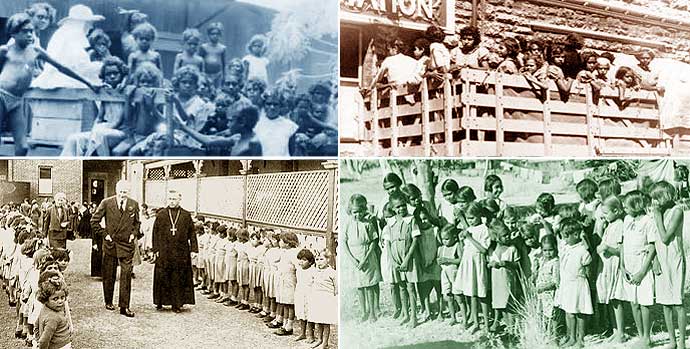
Some historical images of children stolen from First Nations parents and assimilated in orphanages and church institutions - First Nations children are now being stolen from their parents at larger rates than ever before.
For many of the Stolen Generation, the papers for most of them show where they were taken from. They may not be able to connect directly to their families, but we do know where they were taken from and, in this regard, nobody has a right to say that they do not belong. This is their choice and it is their right to identify with the Nation that they or their ancestors came from. This means that they do belong and that they are entitled to that ancient knowledge and no-one has a right to say they do not.
Having spoken with our senior Elders, Lawmen and Law women there is a move that we must make, that is, to be inclusive, not exclusive. It then becomes a choice for those who were affected by forced removals to go back and learn that Law and culture, proper way, and not be divided for any reason.
Going forward the process is not about Sean Gordon's recent ABC radio statement (29 May 2017) when he alluded to the fact that there should be two processes: one for the educated, assimilated people who no longer have their Law and culture and one for the fullbloods who retain their Law and culture in full. This attitude underscores what was happening at the National Convention. The Convention organisers unashamedly manipulated Alison Hunt to control the plenary sessions by having her rule that the process in the plenary sessions was governed by traditional protocols, but Lawmen were making it clear on the outside that this is a different type of meeting and that the First Nations Law should not control the freedom of the peoples' voices, and they were disturbed that this was happening.
A point of clarification must be made at this point. For those who believe our Law and culture is lost, along with the ceremonies and dances, can be assured that this is not so. This is why the High Court in Mabo (No.2) ruled that we could not revive our Law and Culture and ceremony for the purpose of laying claim under Native Title. Moreover, NAIDOC had a national theme 'Songlines', but clearly did not understand what that truly meant, otherwise they would have promoted it more than they did.

Let me focus on two Songlines. The Emu Songline stretches from the Great Sandy Desert in WA from Wiluna through to Kurring-gai National Park, Sydney. That same Story goes from the Atherton Tablelands in far north Queensland through to Victoria.
Marlu, the Red Kangaroo, comes from the same area of WA through to central NSW, right up the centre of Queensland to Torres Strait Islands and back to Adelaide. We all fit and belong to the many Songlines, the only thing that is missing for some of our Nations across this continent, who allegedly have been a separated from this Law and culture, are the Story and Song in our own languages, nothing else is missing.
Despite European land-clearing we still know where these sites are. That is why we should never negotiate from a deficit position, nor allow us to be divided. If the First Nations choose for their sleeping Law to awaken, this can be done and achieved within one generation.
My concluding observations are in fact very disturbing for several reasons.
- The now promoted notion that there should be two processes of negotiations: one for the 'educated, assimilated people of the east and southeast of Australia' who it is suggested know little to nothing of their cultural legal norms which are dictated to by our Creation (included in this group are the stolen generations and their descendants); and one for the 'fullbloods' and ceremonially educated, who continue to maintain their ancient Law and culture to this day.
- There was no question or discussion that focused on the impact of any constitutional reform on First Nations' Law, culture and ceremony.
- The group chosen to take the process forward was not elected from those elected delegates who carried a mandate to attend the Referendum Council's National Convention, but instead is a mish-mash of delegates, facilitators and paid staff who attended the Regional Dialogues. The most disturbing feature of this group's appointment is that there are no defined terms of reference for them to pursue. Clearly, they have an open-ended agenda, which could mean anything. This cannot be accepted, because there is too much room for corruption.
- On the question of the Treaty/Treaties I can say that there was no consensus on the form that this treaty would take, that is, is it to be a domestic Treaty controlled by existing Australian law, or is it to be a Treaty between Sovereign First Peoples and their Nations, governed by international law? The paid lawyers present were not able to give any definitive response to the question of how will the terms of this Treaty/Treaties be governed and protected, so as to be assured that we do not fall into the same pitfalls as the Native Americans, Canadians and Maori have with their own experiences with their treaties.
It is now essential for these questions to be answered on a national level. It is now essential for communities to be engaged and in the languages chosen by them. At all future meetings interpreter services must be provided.
It is not acceptable for the moderate and right-wing Aboriginal people to pre-determine what non-Aboriginal Australians will accept and will not accept. If these thoughts prevail and the moderate Aboriginal people push this agenda, then we will need our own Makarrata, under our Law, to conclude the differences between our Peoples in respect to grassroots political and legal ambitions to be self-determining and independent, while maintaining our right to be governed by own Law and culture.
The true definition of Makarrata is physical blood-letting, sometimes death as payback, along with some very intimate and sacred ceremonies after the blood-letting or tribal killing occurs.
After the sacred ceremonies are concluded all is finished and we have resumption of societal norms. The reason why the NAC changed the title back to Treaty, instead of Makarrata, was that the Australian government was saying the Makarrata could be accepted under Australian colonial law as a domestic treaty. The other influencing factor was the request from the community consultations on Treaty at Santa Theresa in the Northern Territory in early1984. The Community Elders at Santa Theresa were adamant that the Makarrata terminology must not be used in their presence at the Santa Theresa consultations. The Elders knew the Makarrata Law and said that most of their community was operating under two spiritual/religious themes, their own and the Bible. Understanding the meaning of Makarrata concerned them greatly and they expressed reluctance to participate further.
We have the right to free ourselves from tyranny and oppression. We have the right to our own identity and nationality. We have the right to determine freely our own economy. We have the right to determine our own political affiliations and governance. We have the right to own all our the natural resources on and within our lands and waters.
We cannot be arbitrarily criminalised and incarcerated for 'otherness'.
When developing a program for going forward, my mob, the Euahlayi and the far western Gomeroi, will make our own determinations on our pathway forward and will not be bound by the confusion and mess that is currently being played out.
I believe there are many other First Nations who are of the same mind."
 Contact: Ghillar Michael Anderson
Contact: Ghillar Michael AndersonConvenor of Sovereign Union of First Nations and Peoples and Head of State of the Euahlayi Peoples Republic -
Contact Details for Ghillar
